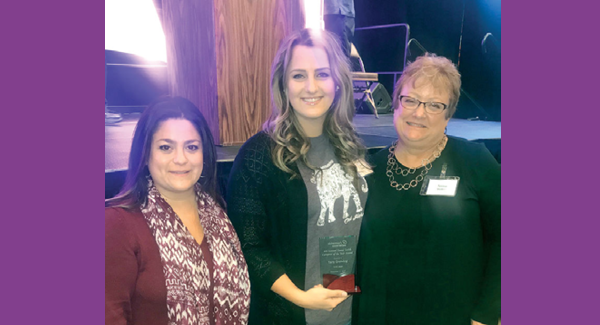Nursing student Tara Greiving was awarded the 2017 Duane Smith Caregiver Award on Nov. 2 at the Alzheimer’s Association conference.
Greiving’s care-taking journey started in high school when her 59-year-old grandmother, Karla Hamilton, was diagnosed with early onset Alzheimer’s.
Hamilton was diagnosed in fall 2013 and by spring 2015, it was decided that she was no longer able to live on her own. Greiving has always been focused on pursuing a future in health care so it felt natural for her to step in and help.
Greiving’s mother, Tammy, wanted to help care for Hamilton as much as she could but was working full time and lived 20 minutes away, so Greiving decided to move in with her grandmother in March during her high school senior year. She continued to live with her grandmother as she pursued her college degree at Newman until Hamilton’s passing this past May.
Greiving graduated from both Derby High School and Butler Community College in spring 2015. She obtained her associate’s degree a week before getting her high school diploma. She will graduate from Newman University in December with her Bachelor of Science in Nursing and plans to take her NCLEX (National Council Licensure Examination) soon to become a registered nurse.
Greiving knew she wanted to work in health care from a young age.
She said, “I like the more personal level that nursing provides. I like to communicate with my patients and take care of their needs. It’s nice to have that connection with them.”
Greiving’s mother is thankful and proud of her daughter. She said, “I feel strongly that the compassion and dedication shown by Tara while taking care of Grandma Karla will continue and forever be a driving force in a successful career of caring for others facing a similar journey of caregiving.”
Although Greiving moved in with her grandma while she was still in high school, she said, “I never felt like I didn’t get the chance to do things with my friends.”
Greiving explained that she and her mother worked as a team to take care of her grandma. She never missed out on school events, such as prom, but she stayed busy with her part-time job, high school and college courses, along with caring for her grandmother.
“At first, it wasn’t like she needed a lot of physical help,” said Greiving. “It was mainly just reminders and helping her eat.”
Her grandmother also suffered from rheumatoid arthritis so assistance with the cooking and cleaning was appreciated. As time went on, Greiving quit her part-time job at an assisted living facility due to her grandmother’s declining health. She and her mother began to provide full-time in-home care for her, helping with tasks as simple as getting out of bed and getting dressed.
Tammy said, “Tara has sat through countless hours of medical appointments, took the blunt of Mom’s confusion, and showered her with the love and attention that is welcomed from a grandchild.” She added that “it became Tara’s mission in life to maintain her grandmother’s dignity by coloring and styling her hair, applying makeup, putting together a stylish clothing ensemble, and keeping up with other various personal hygiene concerns.”
Although Greiving was the only family member living with her grandmother and administering most of her care, she said she couldn’t have done it without the help of others.
“Taking care of someone with Alzheimer’s feels like a marathon, but you need a relay team,” she explained. “And being able to care for her at home gave her a better life. And for me and my mom, we knew she was getting the best care that she could.”
Between classes, work and caring for her grandmother, free time was sparse, but Greiving used any free time she had to take her grandma out.
Tammy said, “Tara has ensured that having fun would always be at the forefront of her grandmother’s life with daily trips to the coffee house, getting her a beloved lap dog to keep her company, hosting numerous singing and dancing sessions, taking lots of pictures and videos for Mom to enjoy as well as the rest of the family.”
Alzheimer’s patients tend to get anxious or scared in new places and around groups of people. Greiving said that as her grandmother’s social skills deteriorated and she struggled to keep a conversation, the dog helped keep her calm and happy.
Caring for her grandmother helped shape Greiving — she learned patience, time management and coping mechanisms, all of which have helped her through nursing school.
She chose Newman because her brother graduated from Newman and loved it. She said the best part of attending Newman has been “being able to feel comfortable enough with the professors that you can talk to them and actually have a relationship with them. They care about your success and they want you to succeed so they’ll do everything they can to help you.” She also appreciates the small class size and personal attention she gets from her professors.
Not only has Newman provided her with a great education but it has proven to be an understanding atmosphere for a student like Greiving. She said some days she would be late for class or miss class because there was no one available to take care of her grandmother, and her professors were understanding and willing to help her in any way they could. Associate Professor of Nursing Amy Siple teaches courses concerning aging patients and Greiving turned to her multiple times for advice and help with her grandmother. Siple also led her to other resources in the community.
Using resources was an important part of the caregiving process for Greiving. She said, “I know my mom and I couldn’t have done it ourselves.” She used the Alzheimer’s hotline when she needed advice or help with the frustrations that come with caring for someone with the disease. She explained that Alzheimer’s patients are similar to children in many ways. Questioning why they have to get dressed or why they have to eat is a common occurrence. She mentioned how frustrating it was at times to take care of someone who should be able to take care of themselves.
Some days her grandmother would ask to go home and become angered that Greiving wasn’t taking her there, yet she was standing in her home. “A lot of times I thought ‘what am I not doing?’ or ‘what am I doing wrong?’ but it’s nothing that you can fix,” she said.
Senior Services in Derby was also a lifesaver. They provide six hours of free respite care per week, which Greiving said may not sound like much but it was enough for her to be able to go grocery shopping and run errands more efficiently.
Greiving often heard that she was so young to have dedicated her time to caring for her grandmother, but to her age didn’t matter. “It’s not about age, it’s about caring and compassion and everyone’s going to be in different stages of their lives when things like this happen and I just happen to be in high school,” she said.
Through this caregiving journey, her grandmother became her best friend. She said, “It was a very rewarding experience even though it was difficult being busy with school and working but I wouldn’t have traded it for the world.
“A lot of people think it’s so taxing to be a one-on-one 24/7 caregiver and it was, but it was also very rewarding to give her the best she could have in the last few years of her life.”
Duane Smith, a prominent speaker in the Alzheimer’s community, presented Greiving with the award carrying his namesake. Smith said it takes a special person to do what Greiving did. To accept the award, she wore the shirt she created to honor her grandmother at the Walk to Remember Alzheimer’s event.


